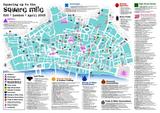
2009-03-28
By Ben Hall in Paris, Bob Sherwood in London and Chris Bryant in Berlin , Financial Times, 27 Mar 2009
Police across Europe are preparing for a wave of protests by radical groups, with London and Strasbourg braced for large and potentially violent demonstrations against the Group of 20 and Nato summits next week.
London is expected to witness anti-capitalist demonstrations on a scale previously unseen in Britain as anger over the financial crisis fuels protests surrounding the meeting of G20 world leaders on Thursday.

Strasbourg, in eastern France, which together with Baden-Baden and Kehl across the border in Germany hosts the summit of 26 Nato leaders the next day, has been turned into a fortress.
Anti-Nato groups predict that up to 60,000 protesters could gather in the city and 11,000 police officers will try to keep them a few kilometres away from the summit proceedings. Border controls have been imposed and the frontier could be closed altogether if there is unrest.
"We have precedents at previous Nato summits of violent confrontations and widespread damage," Roland Ries, the mayor of Strasbourg, said.
Heinz Fromm, head of Germany's domestic intelligence agency, told Reuters he saw "a militant potential of some 3,000 people" at the Strasbourg protests.
British police have detected an "unprecedented" level of activity among anarchist and anti-capitalist groups ahead of the G20 summit. Some are using images of the financial crisis – with some websites bearing the slogan "burn a banker" – to draw broader support to their protests.
The prospect of bitter protests against world leaders has invoked memories of the riots surrounding the World Trade Organisation meeting in Seattle almost 10 years ago and suggests the anti-globalisation movement could be gaining fresh impetus from the economic crisis.
After last December's riots in Greece, extremist groups have stayed active with petrol bomb attacks on business targets. Small numbers of protesters from Italy and France joined Greek demonstrators during the two weeks of unrest and Greek extremist groups had contacts with anti-globalisation and other radical groups abroad, the police said.
Tony Travers, expert in London politics at the London School of Economics, said of the London protesters: "It is a disparate group, but the interesting question is whether the usual suspects – environmentalists, anarchists and anti-capitalists – will be able to tap into a more popular discontent which will then spread."
Even a British government minister has suggested the protests could garner wider public backing from people angry about bankers' salaries and bonuses. Lord Malloch Brown, a Foreign Office minister, said this week: "I think?... the hardliners are going to have a sympathy they haven't had for quite a while."
The cycle of demonstrations will kick off today with a march by thousands of people in the City of London. Organisers insist it will be peaceful, but one said he expected effigies of bankers to be hung from lampposts.
Meanwhile, about 40,000 members of leftwing political parties, trade unions and campaign groups are expected to take to the streets of Berlin and Frankfurt this weekend in one of the biggest shows of organised discontent in Germany since the recession began.
The protest is mainstream but the risk of radicalisation is expected to grow as unemployment rises.
Additional reporting by Kerin Hope in Athens